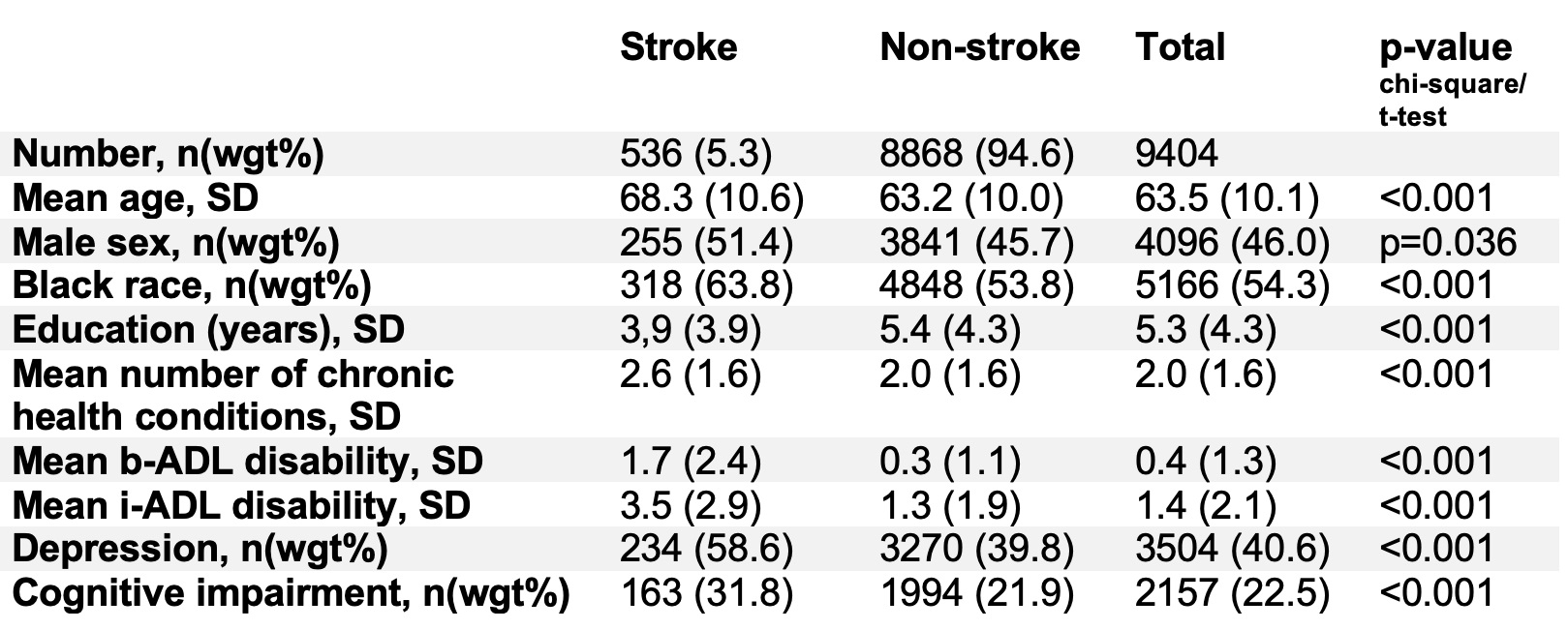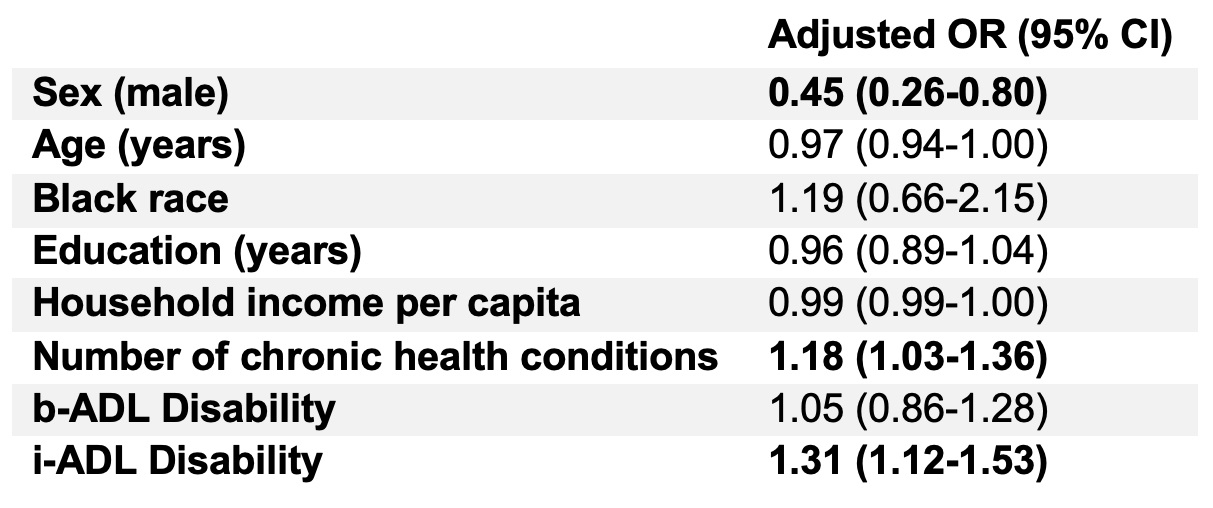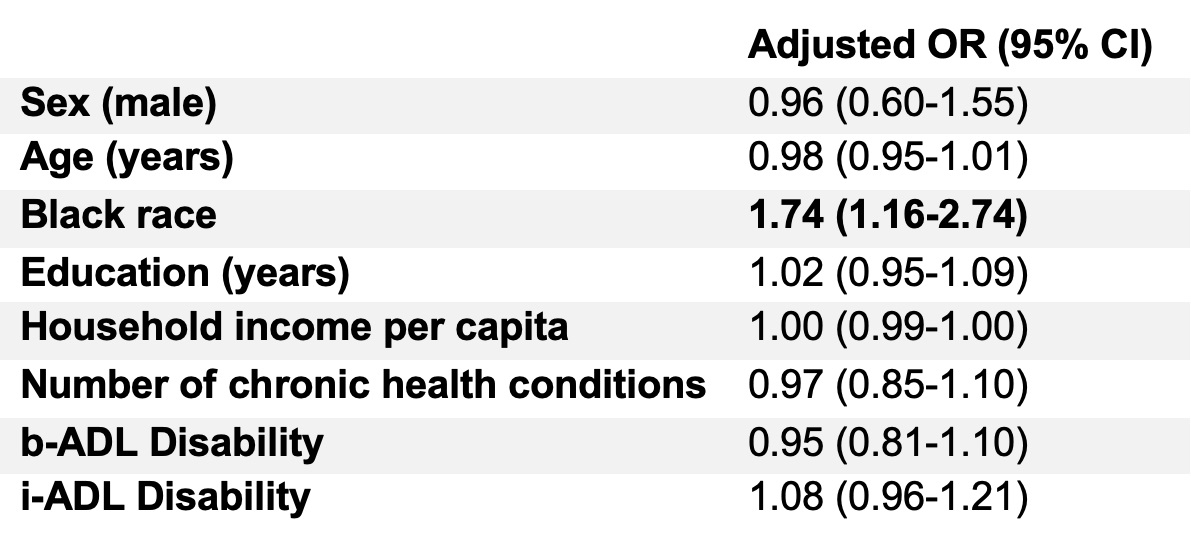Final ID: WP62
Post-stroke cognitive impairment and depression in a Brazilian nationally representative sample
Abstract Body: Introduction: Cerebrovascular diseases are the third leading cause of disability worldwide, which can occur due to the effects of Post-stroke Cognitive Impairment (PSCI) and Post-Stroke Depression (PSD). Higher morbidity and mortality are associated with both conditions following a stroke, but there is a lack of research on this topic in developing countries. We studied the prevalence of stroke and PSCI and PSD in a representative sample of the Brazilian population aged over 50 years, as well as the factors associated with both conditions.
Methods: We performed a retrospective analysis of the ELSI-Brazil study, a nationally representative sample of adults aged 50 and over, including 9412 individuals. Individuals self-reported their sociodemographic characteristics, previous medical history, including prior stroke (transient ischemic attack, ischemic and hemorrhagic stroke), other chronic health conditions and disability in basic (b-ADL) and instrumental activities of daily living (i-ADL). Depression was defined as a score above 4 in the CESD-8 scale. Cognitive impairment was defined through a composite z-score including episodic memory, semantic memory, prospective memory, verbal fluency and orientation. After adjustments by age, sex and education, it was defined as a score below -1.0. Statistical analysis was performed using STATA/SE 17.0 software. Logistic regression was used to study the associated variables with PSD and PSCI.
Results: From the total sample, 536 (5.3%) reported previous stroke. Of these, 58.6% had PSD and 31.8% had PSCI. Individuals who had a stroke were more likely to be older, male, of black race, have lower education, and more chronic health conditions. They also had higher disability in b-ADL and i-ADL, with higher depression and higher cognitive impairment. In the logistic regression, being a woman, having more chronic health conditions and higher disability in i-ADL were associated with PSD, while only being of black race was associated with PSCI.
Conclusion: More than half of individuals with a previous stroke had depression and approximately a third had cognitive impairment. PSD was associated with being a woman, more chronic health conditions and higher disability in i-ADL. PSCI was associated with black race. Understanding the factors associated with PSD and PSCI is important to reduce stroke-related disability and promote better quality of life in individuals with previous stroke.
Methods: We performed a retrospective analysis of the ELSI-Brazil study, a nationally representative sample of adults aged 50 and over, including 9412 individuals. Individuals self-reported their sociodemographic characteristics, previous medical history, including prior stroke (transient ischemic attack, ischemic and hemorrhagic stroke), other chronic health conditions and disability in basic (b-ADL) and instrumental activities of daily living (i-ADL). Depression was defined as a score above 4 in the CESD-8 scale. Cognitive impairment was defined through a composite z-score including episodic memory, semantic memory, prospective memory, verbal fluency and orientation. After adjustments by age, sex and education, it was defined as a score below -1.0. Statistical analysis was performed using STATA/SE 17.0 software. Logistic regression was used to study the associated variables with PSD and PSCI.
Results: From the total sample, 536 (5.3%) reported previous stroke. Of these, 58.6% had PSD and 31.8% had PSCI. Individuals who had a stroke were more likely to be older, male, of black race, have lower education, and more chronic health conditions. They also had higher disability in b-ADL and i-ADL, with higher depression and higher cognitive impairment. In the logistic regression, being a woman, having more chronic health conditions and higher disability in i-ADL were associated with PSD, while only being of black race was associated with PSCI.
Conclusion: More than half of individuals with a previous stroke had depression and approximately a third had cognitive impairment. PSD was associated with being a woman, more chronic health conditions and higher disability in i-ADL. PSCI was associated with black race. Understanding the factors associated with PSD and PSCI is important to reduce stroke-related disability and promote better quality of life in individuals with previous stroke.
More abstracts on this topic:
A Fat Chance: Paradoxical Embolic Stroke from Lipomatous Hypertrophy of the Interatrial Septum
Kalathoor Abraham
Association of Atrial Fibrillation with Lamotrigine in Bipolar I Disorder: An Observational Cohort StudyKim Sodam, Welch Landon, De Los Santos Bertha, Radwanski Przemyslaw, Kim Kibum, Munger Mark
Readers' Comments
We encourage you to enter the discussion by posting your comments and questions below.
Presenters will be notified of your post so that they can respond as appropriate.
This discussion platform is provided to foster engagement, and simulate conversation and knowledge sharing.
You have to be authorized to post a comment. Please, Login or Signup.
Rate this abstract
(Maximum characters: 500)



